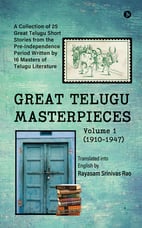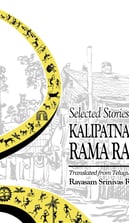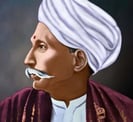Great Telugu Masterpieces Volume-1 (1910-1947)
This volume is perhaps the first such attempt that contains English translations of 25 of the finest Telugu short stories published between 1910 (the inception of the short story) and 1947 (Indian Independence) by noted Telugu authors such as Gurajada Appa Rao, Sripada Subrahmanya Sastry, Munimanikyam Narasimha Rao, Chalam, Kodavatiganti Kutumba Rao, etc.
Between 1910 and 1947, Telugu writers touched upon topics like the freedom struggle, patriotism, human relations, corruption in the government, social reform (selling girls for money, dowry, widow remarriage, eradication of untouchability, etc.), British influence on Indian middle classes, nationalist feelings, and the oppression of rural populations by feudal landlords.
This book contains 25 stories from 16 authors, with Gurajada and Sripada contributing ten stories as they were truly the pioneering writers of short stories in Telugu. The anthology touches on a wide range of themes such as social reform (untouchability, widow remarriage, etc.), rural life, middle-class psychology, women’s issues, satire, corruption, superstitions, pseudo-nationalism, etc.
All the authors have a special place in the annals of Telugu literature for the early lead they took, the wide range of topics they touched and the way they popularised short stories as a literary genre. The stories help the readers relate to the times before independence in the Telugu states, both urban and rural. These eminent writers observed the society around them through different lenses and their narration is spellbinding.
The Authors and their stories covered in this anthology
1. Gurajada Appa Rao (Atonement, What’s Your Name and Matilda)
2. Sripada Subrahmanya Sastry (First Attack, The Nationalist, Eradicating Untouchability, The Minister’s Advice, The Banished, The Tahsildar Dream and The Weeds or The Dying Telugu Pride)
3. Chinta Deekshitulu (Test of Culinary Skills and First Prize)
4. Kanuparti Varalakshmamma (Our Village)
5. Gudipati Venkata Chalam (Wife)
6. Kodavatiganti Kutumba Rao (Bride)
7. Munimanikyam Narasimha Rao (Silver Dining Plate)
8. Karuna Kumara (Polaiah)
9. Suravaram Pratapa Reddy (Vakil Yenkaiah)
10. Potlapalli Rama Rao (Justice)
11. Kanchanapalli Chinavenkata Rama Rao (In Our Village Too)
12. Adivi Bapiraju (Narasanna’s Daughter)
13. Madapati Hanumantha Rao (To Whom?)
14. Kaloji Narayana Rao (We Are Better Off)
15. Nandagiri Indira Devi (The Bet)
16. Krovvidi Lingaraju (The Verdict)
Selected Stories of Kalipatnam Rama Rao
Kalipatnam Ramarao (fondly known as KaRa Mastaru) was undisputedly one of the greatest short story writers in Telugu literature and arguably one of the all-time greats in the genre of stories. A schoolteacher from Srikakulam district of North East Andhra Pradesh, KaRa Mastaru never aimed to be a prolific writer, preferring quality over quantity. His initial stories (1949-1955) revolved around middle-class struggles, family relationships and the different shades of personalities that he observed in people. In his own humble words, written much later, he said they were not the true stories he intended to write. He wrote them because he could. But they still remain some of the finest stories ever written in Telugu for their sheer brilliance in storytelling and the fluid language style he adopted. And they reflect the fact that he could closely observe and study people in their middle-class settings.
Between 1956 and 1972, KaRa Mastaru's stories gained widespread acclaim and were even translated into other languages. This period of his career culminated in a significant achievement- the Sahitya Academy Award in 1972. The stories that led to this recognition were primarily focused on class struggles in rural settings, a theme that mirrored his communist leanings. Among these, his magnum opus, Yagnam, stands out as a testament to his literary genius. I did not have the opportunity to translate Yagnam as it was already done by other writers.
This volume includes eleven stories written by Ka Ra Mastaru, listed below:
Fame Seeker
Attachment from upbringing
A Successful Life
The Loving one
Incomprehensible
No Room
Friendship
Judgment
House
Ignorance-Illiteracy
Will
Gurajada Venkata Appa Rao: The torch bearer of Modern Telugu Literature
I have had the honour and good fortune of translating Gurajada’s Telugu short stories (he wrote only five, out of which I translated three) into English and including them in my book ‘The Great Telugu Masterpieces Volume (1910-1947)’.
Gurajada Venkata Apparao (1862-1915), popularly known as ‘Gurajada’, was the first writer to usher in the modern era of Telugu literature. He started as an English poet in 1882. His English poem ‘Sarangadhara’, written in 1882, made him one of the first Indian-English writers in India.
One of the hallmarks of Gurajada’s writing was how he represented the complex culture of his time by using Urdu and English words in conversational Telugu. This pattern can be seen in his magnum opus “Kanyashulkam”, a play that is a sarcastic yet poignant take on the then-prevailing social practice of selling girls for a price and not letting widows remarry but use them as unpaid servants at home. It also touched upon so many other superstitions and shady practices prevailing in society at that time, especially in Brahmin families. In this play, Gurajada used the vernacular the way it was spoken by different communities. One can also see the liberal use of Urdu words prevalent in society (words like behadbee, kummak, aabroo).
Over a literary career spanning more than three decades (from 1882 to 1915), Gurajada left an indelible mark on Telugu literature. His path-breaking drama 'Kanyashulkam' (Selling Girls), five short stories, a handful of poems, and critical essays stand as a testament to his literary prowess. He emerged as a ‘Vaitalika’, a writer who awakened a dormant society with his powerful and fluid style. His works were a departure from the prevalent feudal stories centred around royal courts, palaces, and kingdoms, and his championing of the vernacular language set the stage for the next generation of writers. This enduring legacy rightfully earns him the title of the 'Father of Modern Telugu Literature’.
Many people don’t know he was credited with being the first Telugu short story writer in the 1910s. His story “Diddubatu” is officially regarded as the first published Telugu short story, although a few others had already written some short stories by then. While Indian mythology and epics are full of short stories, the story as a modern literary genre can be said to have been an English influence. I have managed to obtain three of his stories from that decade and translated them. I couldn’t get hold of the remaining two. I also felt it is apt to have them as the first three stories in this anthology to honour the great writer.
The three stories in this anthology are very different from each other, yet they are bound by a common thread of Gurajada’s people-centric approach and liberal use of spoken language.
In the story ‘Matilda’, he used Urdu words like “Chaman” (small garden) and “Khaayida” (putting someone to hardship) to truly represent the spoken dialect of those times. Matilda is about a young wife and her old husband and how they are perceived and treated by neighbours.
In ‘What is your name?’ he presents a stark picture, laced with satire, of the prevailing religious beliefs, how Hindu society was polarised into Shaiva and Vaishnava sects, and how people were being taken for a ride by leaders and practitioners of these sects. He ends the story in a very sarcastic tone and uses a female character to lecture the sect leaders and prove a point.
In Atonement, his first-published Telugu short story, he touches upon a simple husband-wife relationship. A straying husband quickly realises his mistake, repents and corrects himself. His wife – who is a silent character in the small story - gently and cleverly drives him in that direction and then accepts him for what he is.
I urge English readers to also read Gurajada’s epic drama ‘Kanya Shulkam’, brilliantly translated into English as ‘Girls for Sale’ by Velcheru Narayana Rao.








